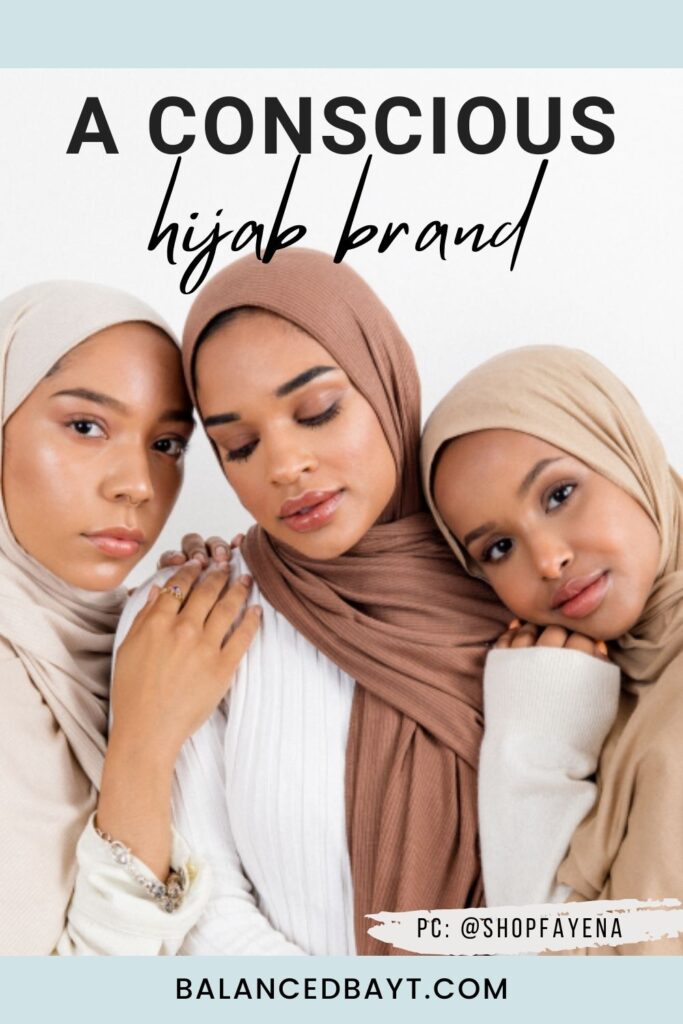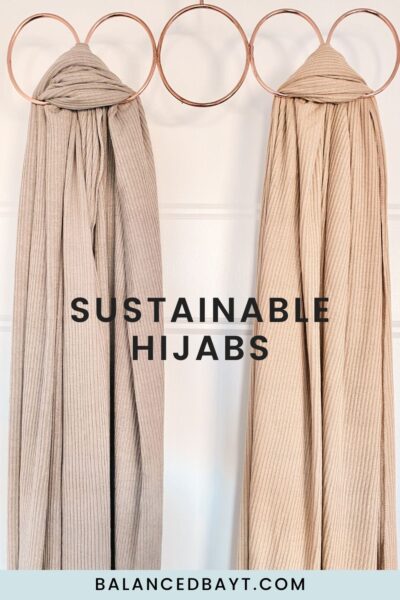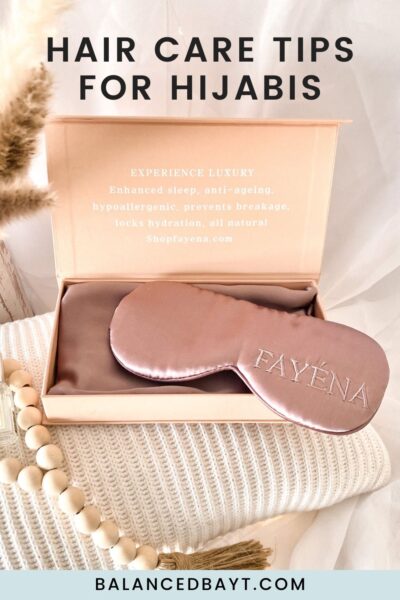With the rise of fast fashion brands and online shopping, buying clothes has never been easier! We can change our wardrobes in a click of a button. Those big, brightly lit stores that now dominate the malls have become the new norm for most of us, enabling us to shop more than the generations before us. As Muslim women living in the west, we too can be guilty of buying from stores like Zara and H&M, both of which cater to modest styles yet are much reasonable than your small Hijabi boutique stores. In this post, we will be looking at ways on how we can be conscious consumer Muslims and will be featuring an ethical hijab brand that aims to educate Muslim women into being conscious consumers.
Disclosure: Products received are from Fayéna. All reviews and opinions expressed in this post are based on my honest and personal view.
What is Fast-Fashion?
In today’s world, Fast Fashion is essentially fashionable and on-trend clothing inspired by the runway and celebrity culture that is cheaply made and sold at a fraction of the price of designer brands. They are the pieces that fill those famous high-street stores at a speed that allows buyers to grab them whilst they are in fashion. As they are super affordable, they are quickly discarded off as soon as that trend is no longer relevant.

Social media and influencer culture have made millennials and Gen-Z’s want to capture everything through photographs, where without immortalizing a moment through a picture, it is like it never happened. With this urge to visually document our lives and particularly our outfits, it has created a type of ‘taboo’ where repeating outfits is seen as a negative thing.
In a survey, it was found that:
41 percent of all 18-25-year-olds feel the pressure to wear a different outfit every time they go out. Another 33 percent of women – regardless of age – consider an outfit to be “old” after wearing it fewer than three times.
SOURCE: THEFASHIONLAW.COm
This has allowed fast fashion brands, particularly online retailers to thrive and hence, the fashion industry has become one of the world’s largest polluters, producing 10% of all humanity’s carbon emissions!
What is a Conscious Consumer?
A conscious consumer is someone aware of the negative effects of purchasing items that are not produced sustainably or ethically. For this reason, they choose to purchase items that adhere to certain guidelines of sustainability and avoid contributing to mass production and wasteful or harmful manufacturing processes.
Why do we need to be Conscious Consumer Muslims?
Many brands have seen the benefits of catering to Muslim consumers by displaying hijab-wearing models. However, they are using this opportunity to their advantage through commercial exploitation. We are targeted with ads from websites like Shein and Wish, all selling the same hijabs which are mass-produced in places like China. These products are made in factories where workers may be working long hours in poor conditions and are often underpaid.
Garment workers are often forced to work 14 to 16 hours a day, 7 days a week. During peak season, they may work until 2 or 3 am to meet the fashion brand’s deadline. Their basic wages are so low that they cannot refuse overtime – aside from the fact that many would-be fired if they refused to work overtime. In some cases, overtime is not even paid at all.
Source: Sustainyourstyle.org

Islam in particular teaches us greatly about the importance of looking after the environment and being conscious about not doing israaf (extravagance). As mentioned in our last post on ‘Islam and the Environment – How to be an Eco-friendly Muslim,’ we looked at 4 ways in which we can start to become an eco-friendly or conscious consumer Muslim. One of these ways was to change up our buying attitude.
And do not cause corruption on the Earth after its restoration… Indeed Allah’s mercy is close to the virtuous.
QURAN – 7:56
‘A common one is clothing. Just because you’ve spotted a new trend or that dress on sale has taken your fancy, doesn’t mean you add it to your cart! Make use of the clothes you have got. Be a conscious consumer Muslim that buying more clothing adds to your carbon footprint and this is ‘Israaf’ of which goes against the balance set by Allah (SWT) and the balance we need to aspire towards for our homes.’
Rather than falling into this vicious cycle of consumption that goes against the teachings of Islam, focus on making sacrifices and doing your part in making the world a better place.
Introducing Fayéna – a conscious Hijab brand
From their website, ‘Fayéna is a team of two ambitious women who set out to solve the problems of sustainability and ethics presented in our community.’
Fayéna realized that though more and more companies are catering to Muslim women, there was no indication about sustainability in all of this. They want to offer Muslim consumers an alternative to unsustainable and unethical fashion, which is usually the most accessible option. Their goal is to leave a lasting impact in the world through educating Muslim women into being conscious consumers.

After receiving my package from Fayéna (which might I add, was beautifully curated in eco-friendly packaging!) and using the products for a month, I can honestly see that their products are of extremely high quality and a great investment. Check out the unboxing video over on our Instagram.
My top picks from Fayéna:
Mulberry Silk Lined Under Cap
As mentioned in my post on Hair Care tips for Hijabis, I had caused a lot of damage to my hair from wearing those tight and stretchy under-caps. As I was unable to find something suitable, I stopped wearing them altogether but that meant that I wasn’t able to wear some styles or materials of hijab. That is until I tried the silk-lined under-caps from Fayéna!
They are a little different from the ones I used to wear but I love how the inner layer (which touches your hair) is made of 100% Mulberry Silk which is natural and odorless. It is suitable for all hair types and can be adjusted to whatever you find comfortable so does not need to be clinging to your scalp. A definite must-have to keep those locks lustrous and healthy.
Ribbed Jersey Hijabs
I received two of their ribbed jersey hijabs in the shades camel and ash. Though they are a little pricier than your average jersey hijabs, the textured fabric is definitely of superior quality and it is made of sustainable and eco-friendly materials. I have been wearing them daily since receiving them and have found the material to be very breathable. Something that you can throw on without the need of pins or an under cap.

I love how each item from Fayéna comes with a card listing the fabric type and composition. The environmental factor is identified, and the majority of their hijabs use TENCEL™ branded Modal fibers. These are produced with sustainably sourced, renewable raw material wood, manufactured by the Lenzing AG company using an environmentally responsible process. An ideal hijab for the conscious consumer Muslim woman!
Mulberry Silk Pillowcase and Eye Mask Set
This was probably the most luxurious item of them all – beautifully packaged making it an ideal gift or if you want to treat yourself. As mentioned above, silk is the only fabric that prevents hair from breaking and irritation. Wearing a hijab all day can cause a lot of damage to the health of your hair. Most pillowcases are made of fabric that creates a lot of friction which ends up damaging our hair further. By switching to a silk pillowcase, replenishes the hair and gives it a chance to breathe. I loved how soft and smooth Fayéna’s 100% Mulberry Silk pillowcase and eye mask were, which felt like a treat at bedtime.
It is so exciting to see how more Muslim-owned brands are choosing to become ethical and that sustainable fashion has become more accessible. We love to see brands like Fayéna who are taking a stand to positively impact the world in a way that pleases our creator and future generations to come.
As Muslims, we should invest in such brands that are promoting a holistic way of life and Islamic values. Trends will come and go but the negative imprint left by fast-fashion brands will stay forever. As a Muslim, to be a conscious consumer is to deeply think about what you are purchasing and ask yourself if it is worth it.




